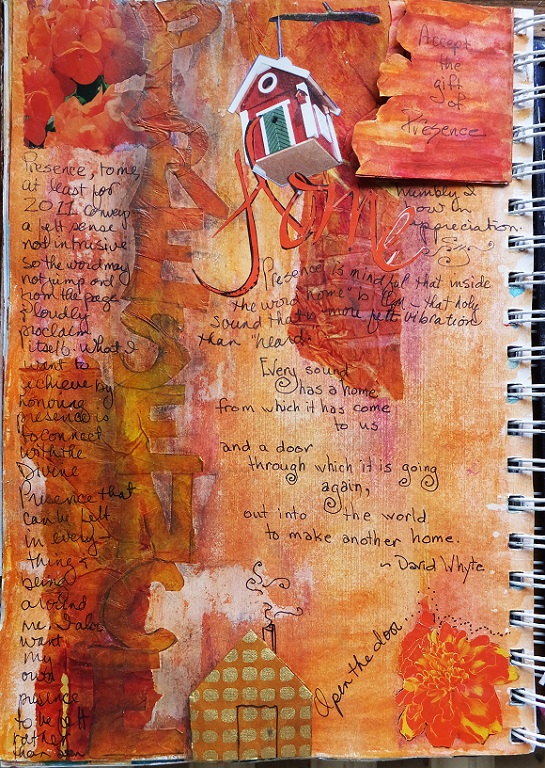My Journal Spilling Work
Susanna Suchak
Susanna is an Irish-Mohawk who grew up in Windsor, Ontario, and studied at the University of Windsor where she earned a BA in Sociology (Family and Social Relations). She attended Huron University College, Faculty of Theology and is working toward a MAIS degree majoring in Cultural Studies and a Certificate in Transformative Language from Goddard College in Vermont, both through distance learning.
Susanna is an artist/coach who makes little books and journals. She now works in private practice helping people to develop insight, creativity and well-being in a process called Journal Spilling. Her blog is http://susannasays.wordpress.com.
What is Journal Spilling?
The process used to achieve the cover image, Open the Door, is called Journal Spilling, a facilitated expressive arts modality which encourages insight, well-being, and creative problem solving.
Journal Spilling initially entails a short meditation, then reading a short poem or piece of prose, followed by a 10–minute journaling session. Writers are instructed to allow emotions to rise and to describe them in their journals freely.
When working in a group setting, we may share what we have written, but there is no requirement to do so. There is no critiquing of another’s work, only a nod of the head or sometimes a sigh. Group participants are instructed not to give advice, or touch another participant or “fix them” (e.g., comments like “there is no need to cry” are not allowed.)
After a group session, individuals reread what they have written, combined with any notes they’ve added based on the group’s interaction and shared readings. They may wish to add more information or details at this time, but are asked to stick to 10 minutes of writing per session.
In the next group session, people can rework their pages by applying gesso, colour, collage (covering over what they have made before) and create a concise, new texti—sometimes shifting our perspective based on insights gained through the process. Sharing after this session is often more lively and interactive.
Through this multi-level healing/learning process, individuals dealing with anger, depression, or anxiety learn to identify symptoms earlier than before and to identify their own triggers.
The process that I developed—or more accurately “fell into”—is rooted in Cognitive Behaviour Therapy combined with yoga and meditation practice. I layered that with what I had learned in MAIS616 (Writing the Self) and MAIS621 (Narrative Possibilities) and combined that with my own experience in health promotion and counselling.
I didn’t intentionally design Journal Spilling, it just “grow’d like Topsy” (Stowe, 1852, p. 144) out of my own experience with compassion fatigue. It is also not art for art’s sake, but based on the idea that expressive writing, reading/writing poetry and visual art release emotions blocked over time, often based on words we could not find during talk therapy sessions. I am pleased with the insights and behavioural changes I’ve noted; program participants report they have noticed some too. There is more work to be done to ascertain whether our experiences can be replicated and if this way of working will benefit other populations. I am hopeful that the enthusiasm Journal spilling has initiated will garner opportunities to deliver it in other circles.
i In Open the Door there is a remembered quotation from a sermon delivered in January 2002. It is a brief excerpt from the poem “The Winter of Listening” by David Whyte.
Open the Door

“Open the Door”, 2011, (journal page) (1), gesso, acrylic paint, tissue, collage, 25 1/2 cm x 17 cm.
Works Cited
Pennebaker, J. (1990). Opening up. New York, NY: The Guilford Press.
Stowe, H. B. (2001). Uncle Tom’s cabin. Toronto: Random House. Modern Paperback Library Edition. Originally published in 1852. I refer here to an online reading URL: http://etc.usf.edu/lit2go/88/uncle-toms-cabin-told-to-the-children/1518/chapter-15-topsy/
Further Reading
Bolton, G. (2010). Reflective practice: Writing & professional development (3rd ed.). London, UK: Sage.
---. (2011). Write yourself: Creative writing and personal development. London, UK: Jessica Kingsley Publishers.
---. (2006). G. Bolton, V. Field, & K. Thompson (Eds.). Writing works: A resource handbook for therapeutic writing workshops and activities. London, UK: Jessica Kingsley Publishers.
Wood, J. (2013). Transformation through journal writing: The art of self-reflection for the helping professions (1st ed.). London UK: Jessica Kingsley Publishers.